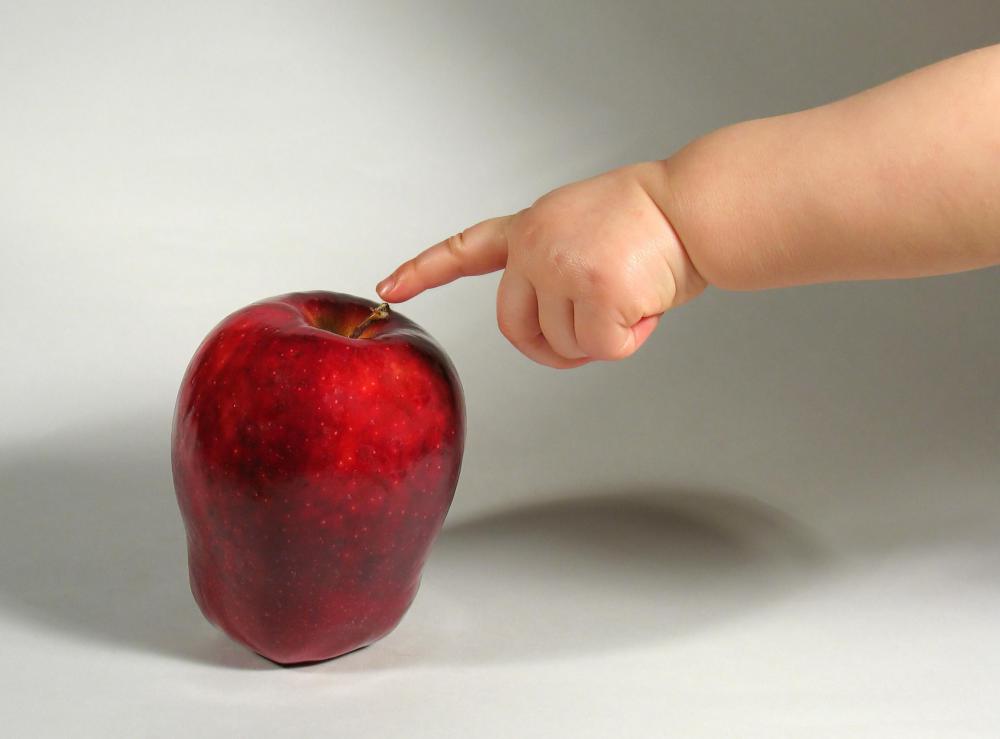At WiseGEEK, we're committed to delivering accurate, trustworthy information. Our expert-authored content is rigorously fact-checked and sourced from credible authorities. Discover how we uphold the highest standards in providing you with reliable knowledge.
What Factors Affect Infant Perception?
While some debate exists about the precise meaning of perception, in general it refers to an individual awareness of the surrounding world. Sensory cues like sight, sound, smell, taste, and touch are thus important, especially for infants. Subsequent changes in sensory factors, such as alterations in color, size, or movement, greatly impact infant perception, as do new stimuli. Perception may further extend to how an individual comprehends and evaluates the world. Therefore, mobility and the complexity of structures may also have a sizable impact on infant perception.
Since infants cannot speak or move in the manner of adults, determining infant perception is a matter of mostly guesswork. Researchers have devised certain methods that they believe give some insight into an infant’s perceptual abilities, however. Infants tend to give certain cues when their attention is occupied, such as staring at an object longer or increasing the amount of sucking on a pacifier. Scientists use these actions — as well as physiological cues like heart rate — to document changes in infant perception.

As an infant’s cognitive thinking skills are less developed, infant perception is primarily affected through direct sensory experiences. According to early scientific research, some of the first visual factors that impact an infant’s perception are color and light intensity. Alterations in both of these factors consistently produced alterations in an infant’s average responses.

These sensory perception changes support one of the main principles believed to impact infant perception: novelty. When any new influence is introduced into an infant’s orbit, the child seems to automatically take notice. This can range from new people to new toys, and these new influences can provide the infant with different visual, sound, smell, tactile, or even taste input. Since new objects provide a comprehensive realm of alternative sensory experiences, they gain the infant’s attention. As documented above, changes in the familiar invoke similar responses, while an infant who becomes used to a certain stimulus pays that stimulus less mind.

Mobility further influences an infant’s perception. According to scientific research, fluid movement consistently gains the attention of infants over static objects. Further, movement is what allows an infant to interact with and further perceive the surrounding world. Some of the first perceptual areas in which a growing infancy develops proficiency are depth perception and size perception. Not coincidently, these are some of the important principles through which an individual orients himself or herself into the wider world.
Early sensory perception and novelty affinities allow infants to develop the rudimentary beginnings of higher-order thinking. On a basic level, they begin to make simple comparisons between the old and the new. They also begin to make base associations between certain cues and certain sensory reactions. The foundation for complex thinking is being established, which is supported by research that shows infants prefer complex and involved patterns or designs over more simplistic styles.
AS FEATURED ON:
AS FEATURED ON:













Discussion Comments
@ZipLine-- You're absolutely right but what's interesting though is that despite having poor vision at this stage, infants are quite good at face recognition. Studies show that infants, even ones that are less than a month old, can recognize their mother's face. Isn't it interesting?
Infants have poor perception actually Sight especially is something that develops in the first year of life. That's why infants can only see so far and they do have identifying objects.
They can pick up levels of light, colors and moving objects though. And they can follow moving objects too. But infants can't take notice of details, focus and see things with sharpness soon after birth. It's kind of a blur at birth and slowly improves getting to a decent point on and after the first six months.
I think that sounds, smells, touch and taste have a greater role in perception at this stage of life.
I don't have children but a few of my friends do. I was over at a friend's house this weekend and had a skirt on that had some shiny buttons. My friend's son took immediate notice and stared at my skirt for a long time. And when I held him, his entire attention was on the skirt and he started touching the shiny buttons.
I realized then that infants are sensitive to shiny things. I guess it's that it reflects light.
Post your comments